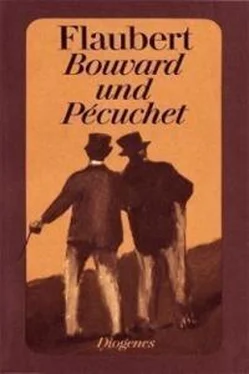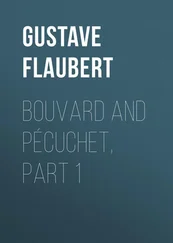One morning, while they were going to buy tobacco, they saw a crowd in front of Langlois' door. The public conveyance from Falaise was surrounded, and there was much excitement about a convict named Touache, who was wandering about the country. The conductor had met him at Croix–Verte between two gendarmes, and the people of Chavignolles breathed a sigh of relief.
Girbal and the captain remained on the green; then the justice of the peace made his appearance, curious to obtain information, and after him came M. Marescot in a velvet cap and sheepskin slippers.
Langlois invited them to honour his shop with their presence; they would be more at their ease; and in spite of the customers and the loud ringing of the bell, the gentlemen continued their discussion as to Touache's offences.
"Goodness gracious!" said Bouvard, "he had bad instincts. That was the whole of it!"
"They are conquered by virtue," replied the notary.
"But if a person has not virtue?"
And Bouvard positively denied free–will.
"Yet," said the captain, "I can do what I like. I am free, for instance, to move my leg."
"No, sir, for you have a motive for moving it."
The captain looked out for something to say in reply, and found nothing. But Girbal discharged this shaft:
"A Republican speaking against liberty. That is funny."
"A droll story," chimed in Langlois.
Bouvard turned on him with this question:
"Why don't you give all you possess to the poor?"
The grocer cast an uneasy glance over his entire shop.
"Look here, now, I'm not such an idiot! I keep it for myself."
"If you were St. Vincent de Paul, you would act differently, since you would have his character. You obey your own. Therefore, you are not free."
"That's a quibble!" replied the company in chorus.
Bouvard did not flinch, and said, pointing towards the scales on the counter:
"It will remain motionless so long as each scale is empty. So with the will; and the oscillation of the scales between two weights which seem equal represents the strain on our mind when it is hesitating between different motives, till the moment when the more powerful motive gets the better of it and leads it to a determination."
"All that," said Girbal, "makes no difference for Touache, and does not prevent him from being a downright vicious rogue."
Pécuchet addressed the company:
"Vices are properties of Nature, like floods, tempests."
The notary stopped, and raising himself on tiptoe at every word:
"I consider your system one of complete immorality. It gives scope to every kind of excess, excuses crimes, and declares the guilty innocent."
"Exactly," replied Bouvard; "the wretch who follows his appetites is right from his own point of view just as much as the honest man who listens to reason."
"Do not defend monsters!"
"Wherefore monsters? When a person is born blind, an idiot, a homicide, this appears to us to be opposed to order, as if order were known to us, as if Nature were striving towards an end."
"You then raise a question about Providence?"
"I do raise a question about it."
"Look rather to history," exclaimed Pécuchet. "Recall to mind the assassinations of kings, the massacres amongst peoples, the dissensions in families, the affliction of individuals."
"And at the same time," added Bouvard, for they mutually excited each other, "this Providence takes care of little birds, and makes the claws of crayfishes grow again. Oh! if by Providence you mean a law which rules everything, I am of the same opinion, and even more so."
"However, sir," said the notary, "there are principles."
"What stuff is that you're talking? A science, according to Condillac, is so much the better the less need it has of them. They do nothing but summarise acquired knowledge, and they bring us back to those conceptions which are exactly the disputable ones."
"Have you, like us," went on Pécuchet, "scrutinised and explored the arcana of metaphysics?"
"It is true, gentlemen—it is true!"
Then the company broke up.
But Coulon, drawing them aside, told them in a paternal tone that he was no devotee certainly, and that he even hated the Jesuits. However, he did not go as far as they did. Oh, no! certainly not. And at the corner of the green they passed in front of the captain, who, as he lighted his pipe, growled:
"All the same, I do what I like, by God!"
Bouvard and Pécuchet gave utterance on other occasions to their scandalous paradoxes. They threw doubt on the honesty of men, the chastity of women, the intelligence of government, the good sense of the people—in short, they sapped the foundations of everything.
Foureau was provoked by their behaviour, and threatened them with imprisonment if they went on with such discourses.
The evidence of their own superiority caused them pain. As they maintained immoral propositions, they must needs be immoral: calumnies were invented about them. Then a pitiable faculty developed itself in their minds, that of observing stupidity and no longer tolerating it. Trifling things made them feel sad: the advertisements in the newspapers, the profile of a shopkeeper, an idiotic remark overheard by chance. Thinking over what was said in their own village, and on the fact that there were even as far as the Antipodes other Coulons, other Marescots, other Foureaus, they felt, as it were, the heaviness of all the earth weighing down upon them.
They no longer went out of doors, and received no visitors.
One afternoon a dialogue arose, outside the front entrance, between Marcel and a gentleman who wore dark spectacles and a hat with a large brim. It was the academician Larsoneur. He observed a curtain half–opening and doors being shut. This step on his part was an attempt at reconciliation; and he went away in a rage, directing the man–servant to tell his masters that he regarded them as a pair of common fellows.
Bouvard and Pécuchet did not care about this. The world was diminishing in importance, and they saw it as if through a cloud that had descended from their brains over their eyes.
Is it not, moreover, an illusion, a bad dream? Perhaps, on the whole, prosperity and misfortune are equally balanced. But the welfare of the species does not console the individual.
"And what do others matter to me?" said Pécuchet.
His despair afflicted Bouvard. It was he who had brought his friend to this pass, and the ruinous condition of their house kept their grief fresh by daily irritations.
In order to revive their spirits they tried discussions, and prescribed tasks for themselves, but speedily fell back into greater sluggishness, into more profound discouragement.
At the end of each meal they would remain with their elbows on the table groaning with a lugubrious air.
Marcel would give them a scared look, and then go back to his kitchen, where he stuffed himself in solitude.
About the middle of midsummer they received a circular announcing the marriage of Dumouchel with Madame Olympe–Zulma Poulet, a widow.
"God bless him!"
And they recalled the time when they were happy.
Why were they no longer following the harvesters? Where were the days when they went through the different farm–houses looking everywhere for antiquities? Nothing now gave them such hours of delight as those which were occupied with the distillery and with literature. A gulf lay between them and that time. It was irrevocable.
They thought of taking a walk as of yore through the fields, wandered too far, and got lost. The sky was dotted with little fleecy clouds, the wind was shaking the tiny bells of the oats; a stream was purling along through a meadow—and then, all at once, an infectious odour made them halt, and they saw on the pebbles between the thorn trees the putrid carcass of a dog.
Читать дальше








![Гюстав Флобер - Закат Карфагена [Сборник]](/books/414440/gyustav-flober-zakat-karfagena-sbornik-thumb.webp)


